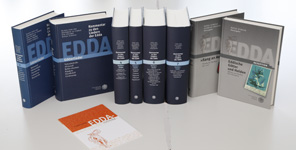- GU Home
- Fachbereich 10 - Neuere Philologien
- Institute
- Skandinavistik
- Edda-Forschung
Willkommen auf den Seiten zur Edda-Forschung des Frankfurter Instituts für Skandinavistik

Wagners Ring des Nibelungen, Tolkiens Lord of the Rings, das Reformhaus Freya, Bismarcks Hödurreden, gegenwärtige neuheidnische Strömungen oder japanische Mangas – sie alle berufen sich auf nordische Mythen, die in den unterschiedlichsten Kontexten, Epochen und Ländern aufgegriffen und verwendet wurden. Mit Ausnahme des Nibelungenstoffs ist die ›germanische Mythologie‹, wie die Götter- und Heldengeschichten in Deutschland meist irreführend bezeichnet werden, zunächst aber nur in Nordeuropa greifbar, überliefert vor allem in zwei Edda genannten isländischen Texten aus dem 13. Jahrhundert – der Liederedda und der Snorra Edda. Heute bedürfen diese Texte der Übersetzung und Erläuterung. Aus diesem Grund widmet sich die Frankfurter Edda-Forschung zum einen der philologischen und literaturwissenschaftlichen Kommentierung der Eddalieder; zum anderen untersucht sie das Fortleben nordischer Mythologie und Heldensage von den Anfängen ihrer schriftlichen Überlieferung im Mittelalter bis zur Gegenwart in internationaler Perspektive.
Der Edda-Kommentar wurde 1991 konzipiert und seit November 1992 von der Deutschen Forschungsgemeinschaft (DFG) gefördert; das Projekt Edda-Rezeption existiert seit 2003 und erhält seit März 2007 die Förderung der DFG. In Zusammenarbeit beider Projekte entsteht eine umfangreiche Sammlung und Dokumentation von Quellen und Forschungsliteratur zur nordischen Mythologie und Heldensage (Edda-Sammlung).
Die Edda-Sammlung gehört zu den Sammlungen an der Goethe-Universität.
Wagner’s Ring des Nibelungen, Tolkien’s Lord of the Rings, the health food store chain Freya, Bismarck’s Hödurreden (»Speeches about Hödur«), contemporary neopagan movements and Japanese mangas – these are only a few examples of how Norse myths have been adapted and used in the most diverse contexts, epochs and countries. With the exception of the Nibelung legend, the legends about gods and heroes, oft en misleadingly called »Germanic mythology«, are in fact only known to us in the forms in which they are transmitted in the North, most importantly in two Icelandic texts from the 13th century that go under the term Edda – the Poetic Edda and the Snorra Edda. These texts can only be comprehended today with the help of translations and explanatory notes. For this reason research in Frankfurt approaches the subject ›Edda‹ from two angles: on the one hand by means of a commentary elucidating the philological textual problems posed by the Eddic poems themselves, on the other hand by an examination of the ways in which Norse mythology and heroic legend have lived on, from their first transmission in written form in the Middle Ages down to the present.
The new commentary to the Poetic Edda began to take shape in 1991 and has been financed by the Deutsche Forschungsgemeinschaft (DFG) since November 1992. The project »Edda-Reception« took up its work in 2003 and has been supported by the DFG since March 2007. In conjunction with the two projects and as a result of the cooperation between them an extensive collection and documentation (»Edda Collection«) is being built up that embraces both aspects of the complex Norse mythology and heroic legend: the sources (medieval and post-medieval) and the scholarly literature devoted to them.
The Edda Collection is part of the collections at the Goethe University.
Kontakt
Institut für Skandinavistik
Geschäftszimmer
Miriam Schmitthenner
Norbert-Wollheim-Platz 1
Raum 155
D-60629 Frankfurt am Main
Tel. +49 (069) 798 32987
schmitthenner[at]em.uni-frankfurt.de
Öffnungszeiten
Montag bis Donnerstag 10-14 Uhr
Freitag 10-13 Uhr
Während der vorlesungsfreien Zeit bleibt das Sekretariat freitags geschlossen!
Haus-/Paketanschrift:
Institut für Skandinavistik
Norbert-Wollheim-Platz 1
D-60323 Frankfurt am Main
- Aktuelles und Presse
- Pressemitteilungen
- Öffentliche Veranstaltungen
- Uni-Publikationen
- Aktuelles Jahrbuch
- UniReport
- Forschung Frankfurt
- Aktuelle Stellenangebote
- Frankfurter Kinder-Uni
- Internationales
- Outgoings
- Erasmus / LLP
- Goethe Welcome Centre (GWC)
- Refugees / Geflüchtete
- Erasmus +
- Sprachenzentrum oder Fremdsprachen
- Goethe Research Academy for Early Career Researchers
- Forschung
- Research Support
- Forschungsprojekte, Kooperationen, Infrastruktur
- Profilbereich Molecular & Translational Medicine
- Profilbereich Structure & Dynamics of Life
- Profilbereich Space, Time & Matter
- Profilbereich Sustainability & Biodiversity
- Profilbereich Orders & Transformations
- Profilbereich Universality & Diversity





